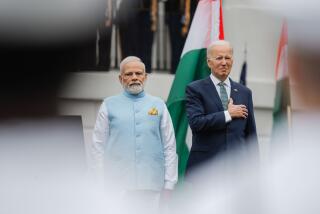Tiny Village Makes Last Stand for Its Land
- Share via
TURI TOLA, India — For the eight tribal families of Turi Tola and other villages near the Parej East strip mine, it’s not the first time a gaping black hole has threatened to swallow their homes.
But this time, they are being asked to give up their lands to make way for a coal mine not just in the national interest, but at the behest of international forces. Their village lies on the expanding edge of a state-owned mine financed by the World Bank.
The villagers, from the Turi tribe of traditional basket weavers, settled on their present site about 600 miles southeast of New Delhi in the mid-1980s after being evicted from their ancestral lands nearby to make way for another open pit coal mine.
Many left their land voluntarily, in exchange for jobs in the mine.
This time, the offer of jobs is not on the table. In exchange for loans to the mining company totaling $563 million, the World Bank is demanding business efficiencies that will mean increased reliance on mechanization, cutting Coal India Ltd.’s labor force by up to one-third while increasing the amount of tribal land needed for its mines.
What the World Bank wants is key. Coal is India’s primary energy source, and Coal India needs the bank’s help to modernize its operations and become profitable.
“Last time they took our land, at least they gave a job to our family,” said village matriarch Girwa Turi, her arms ringed in traditional tattoos common to married Turi women. “This time, they say there are no more jobs. We will not give up our lands.”
The World Bank made a $63-million loan to Coal India last year for “social and environmental mitigation.” The company plans to use the money to resettle villagers on sites with electricity and water, unheard of luxuries for most rural Indians. But the villagers would receive no legal title to their new lands, a fact often cited by critics of the proposal.
M.P. Roy, general manager for Coal India’s resettlement and rehabilitation program, said Indian law bars the company from giving away state-owned land.
“We want to do it and the World Bank wants us to do it. But at the moment, we cannot,” he said.
Instead of money or jobs, people displaced by the mine are to receive training to make their living from poultry and dairy production and other “self-employment” projects.
If that offer does not draw takers, the government is prepared to use tough tactics. A Coal India subsidiary already has gone to court seeking eviction of some villagers.
The Medical Mission Sisters, a charity that has been working with local residents since 1981, is helping pay for a lawyer to represent the villagers. The group’s Gemma Mendez said the self-employment plan is misguided.
“These new self-employment schemes cannot work with these tribal people,” she said. “You give them chickens to raise--they eat chickens. The concept of the marketplace is just not part of their culture. The forest has always provided what they need.”
David Marsden, who heads the World Bank’s social development unit in New Delhi, which helped Coal India plan the villagers’ future, said that without the option of giving jobs or land to displaced people, entrepreneurial training is the best solution.
“What do we do? Preserve their ‘pristine’ culture? Or, rather, give them economic opportunities? I think most of them would prefer the latter,” he said.
“This opposition is actually an effort by these people to get more out of Coal India in exchange for displacement,” he said. “If they can negotiate a better settlement, why not? For the bank, the objective is that people should not end up worse off than before.”
The villagers accuse mine management of using strong-arm tactics to persuade them to move.
Rameshwar Tuli said he was organizing villagers last October to resist pressures to resettle when he was arrested, severely beaten and held in jail for more than a month. He was falsely accused, he said, of attacking a mine employee.
Such stories are not uncommon in India, where independent human rights groups have documented cases of police siding with the powerful against the poor.
While in jail, Rameshwar Tuli lost his job in a steel factory, a job he had been given in exchange for moving his family off tribal land in 1985 to make way for the Parej East mine.
.
More to Read
Sign up for Essential California
The most important California stories and recommendations in your inbox every morning.
You may occasionally receive promotional content from the Los Angeles Times.













